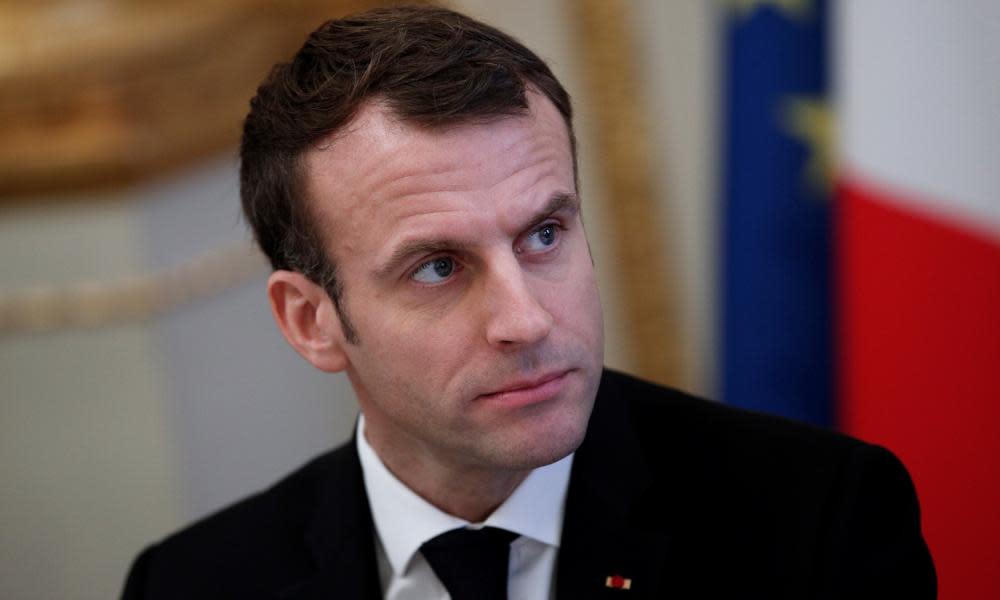Macron studied Machiavelli. But did he learn the key lesson?

Last Wednesday, Emmanuel Macron announced that the planned rise in fuel tax due to come into effect in January had been axed. This had been one of the most visible demands of the gilets jaunes (yellow vests), who have been protesting throughout France for the last month, leading to spectacular street battles with the police last weekend around the Arc de Triomphe. Like his predecessors before him – François Hollande, Nicolas Sarkozy, Jacques Chirac – Macron has had to give in to the streets. Jupiter, as he has often been called, has been brought down to Earth. Macron, it turns out, is a normal president after all.
This is particularly damaging for someone whose campaign was based around the fact that he would get done what others before him had failed to do. In the first year he was quite successful in doing so, notably passing laws to reform the labour market. He has also faced down a number of protests already, including rail worker strikes earlier in the year. But faced with the pressure of the streets, Macron was forced to concede. In doing so, he may have squandered what remained of his political capital, not just with his opponents, but with his own supporters.
The concession didn’t work: the gilets jaunes called for “Act IV” of their protests to happen on Saturday anyway. To a background more reminiscent of conflict zones than seasonal Christmas shopping, the yellow vests fought with the riot police on the Champs-Élysées against a background of boarded-up shops, closed museums (including the Louvre and the Eiffel Tower) and cancelled football matches.
So what went wrong for Macron, the poster boy of the free world, elected on a platform to roll back the populist wave threatening to engulf Europe and the rest of the world?
As a philosophy student at Nanterre, the hotbed of May 1968, the young Macron wrote his undergraduate dissertation on Niccolò Machiavelli, whose infamous book The Prince is still essential reading for any aspiring politician. To the young ruler Machiavelli’s advice was simple: avoid being hated. In the choice between siding with the nobles or with the people, it is always better to have the people on your side.
Yet Macron failed to heed this advice. One of the most popular slogans of the gilets jaunes is “Macron démission!”: Macron resign. Inspecting a town hall that had been burned down earlier in the week, his security services had to quietly exfiltrate him from the angry crowd that had gathered to confront him.
Machiavelli is notorious for having offered a number of counterintuitive pieces of advice. His first is that it is better to be miserly than generous. He explains that to be generous, the young ruler will have to “tax the people very heavily, and raise money by all possible means”. This will lead him to be hated by the people; and, Machiavelli presciently warned: “The first real threat to his power will involve him in grave difficulties.”
By abolishing the ISF – a wealth tax – Macron has been labelled the “president of the rich”. A closer study of his fiscal reforms shows that, although the richest in France have indeed gained the most, the middle class has benefited too. Those who are worse off, however, are poorer people and pensioners: exactly those who are out on the streets.
Machiavelli’s most controversial claim, however, is that it is better to be feared than to be loved, because love is based on gratitude, which is fickle, whereas fear is associated with punishment, which is effective. During his campaign the young, bright, good-looking, charismatic, daring and energetic leader developed quite a devotion among his following, who packed out halls to listen to his speeches. And his ability to make short work of Marine Le Pen in the presidential debate was met with much gratitude in France, Europe and beyond.
Macron has continued to play on his charm since being elected: he was warmly greeted by Angela Merkel after his election, and developed a bromance with the Canadian prime minister, Justin Trudeau. On the domestic front he has gone out of his way to talk directly to people to try to win them over.
The response to yesterday’s protests, however, marked a change of tack. To face down the protests, Macron mobilised 89,000 police and gendarmes across the country, with 8,000 in Paris alone, and these were bolstered by several armoured vehicles. Hundreds of pre-emptive arrests were made, and the riot police changed tactics, quickly identifying troublemakers and removing them from the crowd. The heavy-handedness seems to have paid off, with protesters largely contained and soon disbanded. It remains to be seen whether the gilets jaunes will try to organise an Act V next weekend, but the threat for now seems to have been quashed.
Macron made a long-awaited speech on Monday night to outline his response to the protests, announcing he will raise the minimum wage, offer tax concessions, and help poor pensioners: seemingly taking the “left turn” many have been demanding of him for a while. Will these measures be enough? Only time will tell. But if the protests unwittingly taught him Machiavelli’s lesson that it is better to be feared than to be loved, Macron’s challenge now will be to stop being hated and get the people back onside. Only then will he become a great Prince.
• Hugo Drochon teaches politics at the University of Nottingham

 Yahoo News
Yahoo News 
